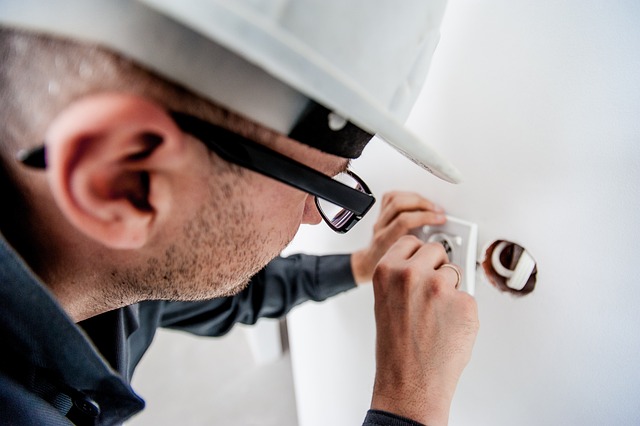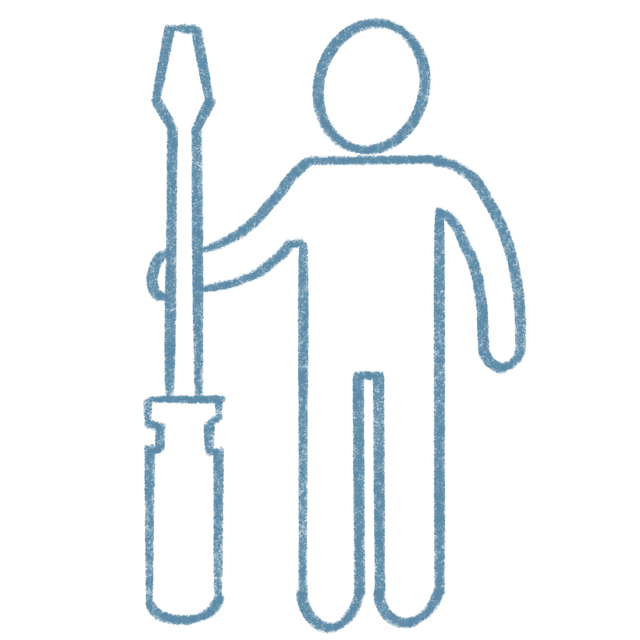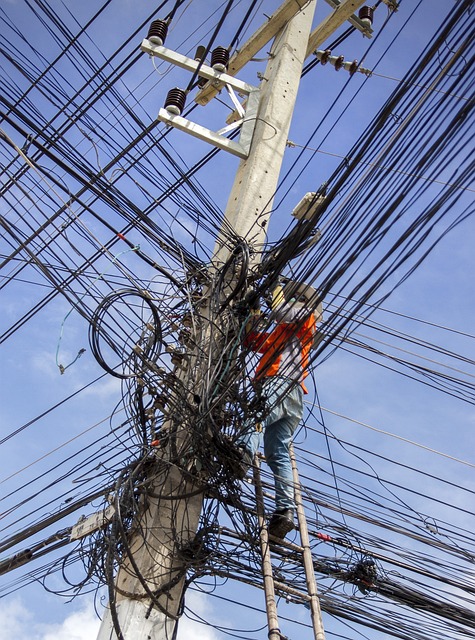Persistent issues like flickering lights, tripped circuit breakers, and overloaded outlets are clear indicators of potential electrical problems in your home, such as faulty wiring or overtaxed circuits. While minor issues with breakers can often be resolved by resetting them, more significant or persistent electrical concerns should prompt a call to a professional electrician for safe diagnosis and repair. Electricians are trained to handle these issues using specialized tools and expertise, determining whether simple repairs or a full system upgrade is needed. Regular check-ups by a licensed electrician can prevent small problems from becoming major ones, thus avoiding costly repairs and the risks of electrical fires or surges. It's crucial to act swiftly on any electrical anomalies to maintain safety. For complex issues beyond basic troubleshooting, professional intervention is essential to ensure compliance with local building codes and to optimize your home's electrical system's performance and safety. Investing in modern safety devices like GFIs and surge protectors, as well as regular maintenance by a qualified electrician, is key to safeguarding your electronics and maintaining an efficient electrical system in your home.
When flickering lights or warm outlets become a regular occurrence in your home, it’s time to address faulty circuits and electrical outlets. This article serves as a comprehensive guide for homeowners to understand and resolve these issues safely and effectively. We’ll explore the common signs of circuit problems, emphasizing when professional intervention by an electrician is necessary. Electricians play a pivotal role in ensuring your home’s electrical system operates smoothly and safely. A step-by-step repair guide for outlets, complete with essential safety precautions, will empower you to tackle minor issues on your own. Additionally, we’ll delve into the fundamental aspects of electrical wiring every homeowner should know, coupled with maintenance tips to prevent future faults. With expert advice from electricians, maintaining your electrical system becomes a manageable task for safeguarding your home’s integrity and functionality.
- Identifying Common Circuit Issues and When to Call an Electrician
- The Role of Professional Electricians in Fixing Faulty Circuits
- Step-by-Step Guide to Electrical Outlet Repair and Safety Precautions
- Understanding Electrical Wiring: A Homeowner's Essential Knowledge for Circuit Maintenance
- Tips for Maintaining Your Electrical System and Preventing Future Faults with the Help of an Electrician
Identifying Common Circuit Issues and When to Call an Electrician

When encountering persistent flickering lights, tripped circuit breakers, or consistently overloaded outlets, it’s time to scrutinize your home’s electrical system. These are indicators of common circuit issues that may stem from faulty wiring, an overtaxed circuit, or aging electrical components. While some problems, like a resetting tripped circuit breaker, can be resolved by flipping the switch back to the ‘off’ and then ‘on’ position, more complex or recurring issues should prompt a call to a professional electrician. A qualified electrician possesses the expertise to safely diagnose and rectify these electrical hiccups, ensuring your home’s safety and the integrity of your electronic devices.
Professional electricians are adept at pinpointing the root cause of your circuit problems, ranging from minor repairs to significant overhauls. They bring specialized tools and a wealth of knowledge to assess whether the solution is a simple fix or if your electrical system requires an upgrade to meet current standards for safety and efficiency. Regular maintenance by an electrician can prevent minor issues from escalating into costly repairs, ensuring your home’s electrical system operates smoothly and reliably. It’s always prudent to address electrical concerns promptly to avoid potential hazards like fires or electrical surges that could damage your appliances or electronics.
The Role of Professional Electricians in Fixing Faulty Circuits

When electrical circuits malfunction, the immediate need for a skilled professional is paramount to ensure the safety and functionality of the entire electrical system within a residential or commercial setting. Professional electricians play an indispensable role in diagnosing and rectifying these issues. Their expertise encompasses identifying the root cause of circuit faults, which may range from tripped breakers due to overloaded circuits to more complex problems like damaged wiring or subpar connections. With a deep understanding of electrical systems, these experts use specialized tools and equipment to safely perform repairs, thereby restoring the flow of electricity and preventing potential hazards such as fires or electrocution.
The services provided by electricians are critical not only for the immediate well-being of occupants but also for the long-term integrity of the property. They adhere to local building codes and standards to ensure that all repairs meet safety and performance requirements. Moreover, their role extends beyond mere repair; they offer preventive maintenance advice to avoid future issues, ensuring that electrical installations operate at optimal efficiency. Their commitment to quality and safety is evident in every job they undertake, making them an essential resource for anyone facing problems with faulty circuits or electrical outlets.
Step-by-Step Guide to Electrical Outlet Repair and Safety Precautions

When dealing with faulty circuits or electrical outlets, it’s always best to approach the situation with caution and seek professional help if unsure. For those comfortable with basic troubleshooting, a step-by-step guide can be followed to repair these issues safely and effectively. Before attempting any repair, ensure the power supply to the circuit is turned off at the main breaker or fuse box to prevent electric shock. Firstly, inspect the outlet for visible signs of wear, such as burn marks, discoloration, or loose-fitting components. If the outlet appears damaged beyond minor issues, it’s advisable to replace it entirely. To replace an outlet, remove the cover plate and then the screws holding the outlet to the electrical box. Carefully detach the wires from the outlet using a wire stripper, and attach them to a new outlet according to the manufacturer’s instructions. Once reconnected, secure the wires with electrical tape or wire nuts and place the new outlet back into the electrical box, fastening it with screws. Afterward, test the outlet with a voltage tester to ensure there is no live current flowing through the wires. If you encounter any complex issues or if the outlet requires specialized attention, it’s always prudent to contact a licensed electrician. Safety precautions are paramount when dealing with electrical systems; thus, adhering to local electrical codes and using appropriate safety equipment is crucial for both the repair and your well-being. Remember, handling electricity can be hazardous, so if at any point you feel unsafe or the task exceeds your expertise, a professional electrician should be consulted without delay.
Understanding Electrical Wiring: A Homeowner's Essential Knowledge for Circuit Maintenance

homeowners can greatly benefit from a basic understanding of their household’s electrical wiring to ensure circuit maintenance is performed effectively. Knowledge of the system’s components, such as the role of circuits, outlets, and breakers, is crucial for identifying faults and taking appropriate action. This foundational understanding allows for timely repairs or the calling in of a professional electrician when complex issues arise. Circuit maintenance involves regular checks for signs of wear or damage to wires and outlets, which can include discolored outlets, flickering lights, or repeatedly tripped circuits. These are indicators that something may need attention. Addressing these issues promptly not only enhances safety but also prevents minor problems from escalating into larger, more costly repairs. When in doubt or faced with an electrical issue beyond one’s expertise, consulting a licensed electrician is always the safest course of action due to the potential risks involved with electrical systems. They possess the specialized knowledge and tools necessary to diagnose issues accurately and perform repairs safely, thereby maintaining the integrity and functionality of your home’s electrical system.
Tips for Maintaining Your Electrical System and Preventing Future Faults with the Help of an Electrician

Regular maintenance of your electrical system is pivotal in preventing faults and ensuring the safety and efficiency of your home’s power supply. An electrician can provide expert advice tailored to your specific needs, conducting thorough inspections that identify potential issues before they escalate. It’s advisable to schedule annual check-ups with a certified electrician to assess your entire electrical system, including all wiring, circuits, and outlets. This proactive approach can uncover minor problems before they lead to larger, more costly repairs. Additionally, ensure that your electrician checks for ground fault interrupters (GFIs) in areas prone to moisture, such as bathrooms and kitchens, and tests these regularly. Adequate protection with GFIs can prevent electrical shocks and reduce the risk of fires.
Investing in modern safety devices and adhering to recommended maintenance practices can significantly extend the lifespan of your electrical system. An electrician can install surge protectors to safeguard your sensitive electronics from voltage spikes, which are a common cause of appliance failure. They can also upgrade older circuit breakers to new models that offer greater protection and faster response times in case of an overload. It’s important to keep all electrical devices in good working order and to replace any cords or plugs that show signs of wear. By combining these precautionary measures with the expertise of a professional electrician, you can effectively minimize the likelihood of future faults and ensure your home’s electrical system operates at peak performance.
When confronted with faulty circuits or malfunctioning electrical outlets, prompt action is key to ensuring your home’s safety and functionality. Homeowners should be well-versed in identifying common issues and recognizing the necessity of professional intervention. A reliable electrician plays a pivotal role in addressing these problems, offering both immediate solutions and valuable guidance to prevent future complications. By understanding the basics of electrical wiring and maintaining your system regularly with the assistance of an expert, you can safeguard your home from potential hazards. Remember, when it comes to electrical repairs, expertise is not just advisable but imperative for the integrity of your living space.
